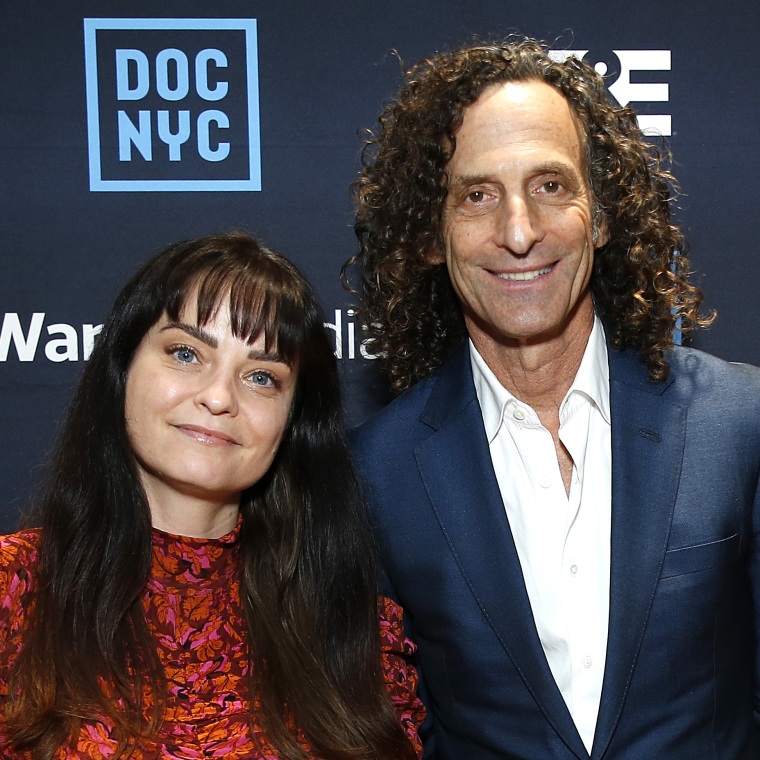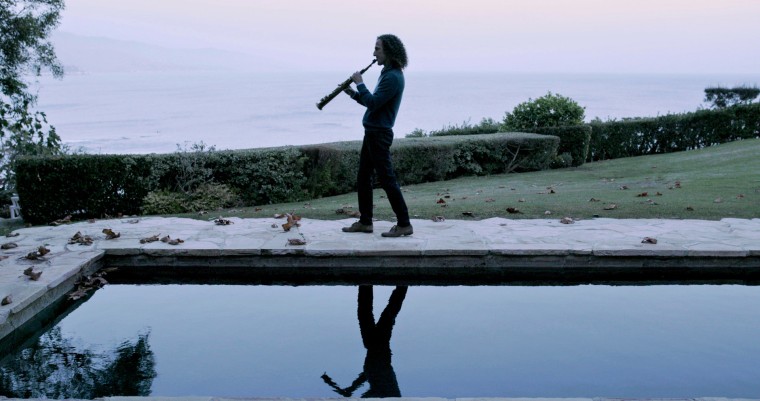Kenny G conquered American popular music, like it or not.
The soprano saxophone melodist, born Kenneth Gorelick, skyrocketed to national celebrity in the 1980s with “smooth jazz” ballads like “Songbird” and “Silhouette.” He remains the best-selling instrumentalist of the modern era, adored by fans from his native Seattle all the way to China, where his easy-listening track “Going Home” is ubiquitous.
But in a career spanning nearly 50 years, Kenny G has been constantly and vehemently blasted by jazz purists and many professional critics. They deride his creative output as flavorless, artistically bankrupt “safe sax” — jazz without the authenticity or the fearlessness.
Penny Lane, the incisive documentary filmmaker behind “Hail Satan?” and “Our Nixon,” explores this sharp contrast in “Listening to Kenny G,” a feature-length film that debuts Thursday on HBO as part of “Music Box,” a five-installment documentary series about key chapters in American musical history.
“Listening to Kenny G” is a portrait of the saxophonist’s rise to the top of the Billboard charts and his relentless work ethic. Lane also delves into deeper themes. The film, with a light touch and a keen eye, investigates the sociology of artistic taste, the relationship between musicians and genres, the appropriation of Black styles in commercial music and other knotty ideas.
In a phone interview Wednesday, Lane talked about the film's themes and her own relationship with Kenny G’s body of work. The conversation has been lightly edited for length and clarity.
NBC News: I would describe “Listening to Kenny G” as a Trojan horse in the best sense of the term. You think you’re sitting down to a conventional profile of a famous performer, but then you also get this essay about taste, the evolution of genre, cultural appropriation. How much of the finished film represents your original vision and how much took shape as you made it?
Penny Lane: I would say those bigger philosophical ideas were all in my original pitch. But what I didn’t foresee was Kenny, the person. I had chosen Kenny G as a kind of screen upon which I wanted to project all these ideas, but I hadn’t really thought through what his personality would be like and how talking to him about making art would affect the film.
He’s so weird and great and charismatic and amazing on camera that the film had to expand to make space for him. Funnily enough, the more traditional biographical elements of the film are what I really didn’t think about or plan. [Laughs.] But you’ve seen him. He’s so interesting! You can’t have a character like that and then not explore the character.
The film spends a lot of time with Kenny G behind the scenes — around the house, inside the recording studio, backstage at concert venues. He comes across as very enthusiastic and comfortable with himself. But he acknowledges that the criticism from what he calls the “jazz police” has loomed over his career. How do you think he’s managed to maintain this upbeat attitude despite all the scorn from critics?
I think the professional critics are engaged in a game that he’s not playing. I think it just literally doesn’t matter to what he’s doing, whether critics like him or not.
There was probably a point earlier in his career where that might have hurt his feelings in a more overt way. But I think that Kenny is supremely logical and metric-oriented, so I think he would say: “Well, here’s all this evidence I have that what I’m doing is great, like 75 million records sold, this many albums, this many concert dates, all these people playing my music around the world. Why would I focus on these, like, 10 cranky people?”
I think that’s actually a very psychologically healthy thing. That’s what a cognitive behavioral therapist would tell you to do, right? “Let’s examine the evidence in its totality. Why focus on this one thing?”
I think he was never interested in critical acclaim. There are artists for whom that really matters and others for whom it doesn’t. It doesn’t really matter to him. Generally, he’s a very happy, self-confident person.
The documentary got me thinking about other art — not just music, but film and television and books — where we see a big gulf between the establishment’s critical consensus and popular appetites. Where else do you see this dynamic playing out in a way that you find interesting, maybe even as a future documentary subject?

I think it’s in all fields. I’ve spent so much time thinking about this. It’s certainly true in, say, cuisine: the celebrity chef who might be really popular, but people who love food in a deep way think he’s bad. I think it’s in all creative endeavors.
But what I’ve seen is there’s been a massive shift in our culture, and I’m certain this is some sort of pendulum swing that will continue to swing back and forth forever. We’re in a moment where — there’s this thing on the Internet that says, “Let people enjoy things.” Have you seen that?
Yes.
Yeah! “Let people enjoy things” seems to be a rallying cry on Twitter when it comes to criticism. I think, at this point, the people I know who are film critics would hesitate to post something negative about a Marvel movie, because what’s the point? People are going to be so mad at you for daring to quote-unquote criticize something that people are enjoying.
The way that the critics in the 1990s talked about Kenny —and it was real brutal — that’s just not what I see happening in cultural criticism writ large today. It has swung in the other direction. If you’re a sophisticated person, you’re supposed to like Marvel and Taylor Swift but also Bach. There’s an omnivore attitude now.
I think it can go too far, though. That’s what I didn’t want to do with the film. I don’t want the takeaway to be “Oh well, it’s all relative, anyway, so maybe Kenny G really is as good as Beethoven.” That would just be an absurd takeaway, in my mind. There are still things to talk about, criticism still has value, and dealing with the formal properties of music — those things really matter.
Kenny G is so closely associated with the aesthetics and vibes of the 1980s. I’m thinking specifically of the amazing footage in the film of these Reagan-era shopping malls where his songs are playing basically nonstop. I know you were a kid in the ’80s. In your mind, how does Kenny G embody that era in American life?
That’s a good question. I was so young that inevitably my ideas about what the ’80s were have been shaped in retrospect by historical narratives and even nostalgia, to an extent.
I think what people say about the ’80s is that it was all Reaganite “sunshine in America,” “happy days are here again” optimism. You can hear that in his music, and I think you can also hear the excess of the decade.
I won’t ask you if making this movie made you feel that Kenny G’s music was “good” or “bad,” because that feels contrary to the spirit of the documentary. But what I would like to know is whether your personal relationship with his music changed during the production.
Oh, it changed so much. John Halle, one of the music critics featured in the film, says toward the end, “What music is really about, at the end of the day, is what associations it brings up for you, what feelings it creates.” That’s always going to be tied to your own memory — and so for me, now, when I hear a song like “Forever in Love,” I get pretty emotional.
It’s not because this music is made for me, because it’s not, but because now I’m picturing all these beautiful, happy couples walking down the aisle that I feel I know because I edited them into my movie and I’ve seen them so many times. [Laughs.]
I’ve also been to Kenny G shows, and I’ve looked out into the audience, and I see people blissed out on a date with their husband. I can feel, secondhand, what that music means to them.

